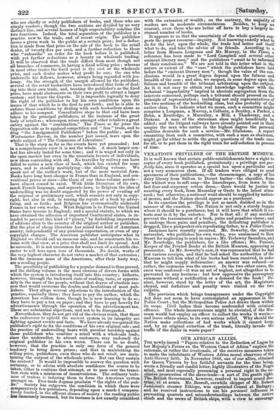VEXATIOUS PRIVILEGE OF THE BRITISH MUSEUM. IT is well known
that certain public establishments have a right to copies of every book published, gratuitously ; a privilege not per- fectly fair, since it operates as a special tax upon a particular and not a very numerous class. If all traders were obliged to send specimens of their publications,—the cheesemonger, a copy of his dairy library from Stilton to Dorset butter—the chandler, from the whitest wax to soft soap—the linendraper, from lawn to the last four-and-sixpenny cotton dress,—there would be justice in exacting every book, from Macaulay or Grote to the latest alma- neck; but otherwise, a national want should be supplied by nation- al means, and the Nation should appear as a purchaser.
In its exaction the privilege is not so much disliked as in the manner of the exaction. The Nation is not only a sturdy beggar where it should be a purchaser, but it will have that which it ex- torts sent to it by the extortee. Nor is that all : if any accident prevent the transmission of a book, pains and penalties ensue; and to undergo those pains and penalties, the defaulting publisher is dragged, like a pickpocket ora repudiating father, to a Police Court.
Instances have recently occurred. Mr. Sowerby, the eminent naturalist, who publishes his own works, was summoned to Bow Street for neglecting to send in copies ; Mr. Trelavrny Saunders, and Mr. Routledge, the publishers, for a like offence ; Mr. ranizzi, Keeper of the Printed Books at the British Museum, appearing as prosecutor. In Mr. Sowerby's case, it was represented that he had lost various receipts, and that he had asked the authorities of the Museum to tell him what of his books had been received, in order that he might supply deficiencies : an answer was refused—or rather, the summons was the answer. In the two other cases, the error was confessed—it was an ad of neglect, not altogether to be prevented in any business : but how oppressive the peremptory summons without a notification or a demand for the book! Pa
' - nizzi however, stood by the letter of the act, the Magistrate obeyed, and forfeiture and penalty were visited on the two culprits.
The provision which brings transgressors under the 'Copyright Act does not seem to have contemplated an appearance in the Police Court ; but the Metropolitan Police Act draws them within its scope. Civil laches thus become confounded with criminal offences. The whole inconvenience might be obviated, if the Mu- seum would but employ an officer to collect the works it wants— and leave others alone, to its own serious relief. Why should the Nation make collections of bad works which it cannot keep, and, by an original extortion of the trash, literally invade the traffic of the dealer in wastepaper?


























 Previous page
Previous page